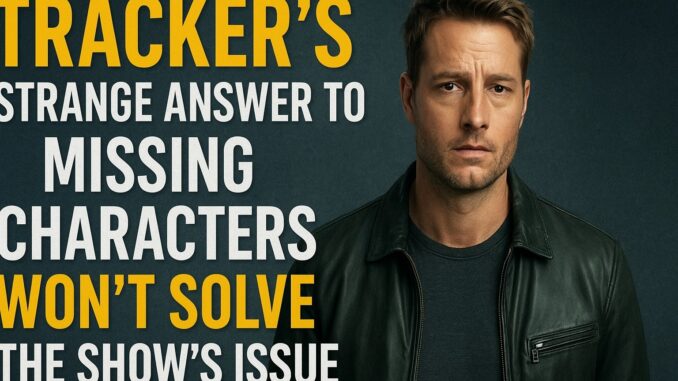
Tracker season 3 has a tall order of resolutions to make as the series moves into its next season, especially with two characters leaving the series, but their answers to the strange disappearances of their cast members won’t solve the root problems with the series. Tracker, which stars Justin Hartley as Colter Shaw, has always featured a slew of side characters, as well.
Tracker season 3 has a tall order of resolutions to make as the series moves into its next season, especially with two characters leaving the series, but their answers to the strange disappearances of their cast members won’t solve the root problems with the series. Tracker, which stars Justin Hartley as Colter Shaw, has always featured a slew of side characters, as well.
Throughout Tracker’s run, there have been some interesting but confusing choices made surrounding the people Colter has on his team. As a transient problem solver, having a home base may not be appealing to Colter, but is often necessary to make sure he can do his job successfully. Originally, Teddi Bruin (Robin Weigert) and Velma Bruin (Abby McEnany) held down the fort.
While Teddi and Velma worked with Colter to bring cases to his attention, Bobby Exley (Eric Graise) was Colter’s one-man tech team and Reenie Greene (Fiona Rene) worked as his roving legal counsel. Despite having a hardworking team around him, things on Tracker haven’t been steady for Colter when it comes to his support. The show’s answers about their missing characters, in turn, has been shady at best.
As Tracker season 3 grows closer, viewers are ready to learn more about how the new exits of McEnany and Graise will be addressed. After Tracker season 2 quickly explained Weigert’s exit, viewers were disappointed at the lack of McEnany’s involvement in the season, and the fact that Graise left the series mid-season and was, in essence, replaced by his cousin Randy (Chris Lee). Though Tracker’s showrunner has addressed the exits head-on, the answer being given doesn’t seem to resolve the strange problem at its roots, leaving it likely to spring back up in the future.
The CBS hit drama Tracker has captured audiences with its intense storylines, mysterious characters, and the undeniable charm of its lead, Justin Hartley. However, one thing fans can’t stop talking about isn’t just the thrill of the chase—it’s the absence of certain key characters. Recently, the show’s creators gave a rather strange answer to explain why some familiar faces are missing. Unfortunately, their response doesn’t fix the real issue—it might actually make it worse.
What Happened to the Missing Characters in Tracker?
Fans noticed early on that a few secondary yet beloved characters from earlier episodes had quietly vanished. No dramatic exits, no emotional goodbyes—just gone. When asked about it, the showrunners gave an ambiguous explanation, hinting at “creative direction changes” and “narrative streamlining.”
That’s TV-speak for we wanted to focus elsewhere. But here’s the problem—Tracker built emotional connections with its ensemble. Viewers didn’t just tune in for Colter Shaw’s latest case; they came for the relationships, the humanity, and the chemistry that gave the series heart.
The Showrunner’s “Strange Answer” Explained
According to recent interviews, producers claim the missing characters were cut to make “storytelling more efficient” and to put the spotlight solely on Colter’s journey. On paper, that might sound logical—focus the story, reduce distractions. But fans aren’t buying it.
Why? Because Tracker’s power lies in its people, not just its mysteries. The so-called “efficiency” feels more like emotional emptiness. Instead of tightening the story, it strips away the connections that made the stakes matter.
Why Fans Are Frustrated
Audiences have grown attached to supporting characters who helped shape Colter’s world. Their sudden disappearance feels like losing old friends mid-conversation. Imagine watching a favorite crime drama only for your go-to sidekick to vanish without explanation—confusing, right?
Social media platforms are flooded with posts from upset fans, some even calling the move “lazy writing” or “character erasure.” It’s not about screen time—it’s about storytelling balance.
Character Dynamics Make or Break a Series
Think about shows like NCIS, Criminal Minds, or The Mentalist. Each thrived not only on thrilling investigations but also on the emotional glue between characters. When viewers connect with the team, they invest in the story.
By sidelining or erasing characters, Tracker risks losing that essential bond. Even the most gripping mystery can fall flat without emotional resonance.
Colter Shaw Alone Isn’t Enough
Let’s face it—Justin Hartley is phenomenal. His charisma drives the series, but even the strongest lead needs a solid supporting cast. The lone-wolf trope can only go so far before it starts to feel repetitive.
Without recurring allies or a familiar team dynamic, each episode risks blending into the next. There’s only so much depth a “case of the week” can offer without personal stakes.The Real Problem: A Lack of Narrative Continuity
The strange answer about missing characters highlights a deeper flaw—Tracker’s struggle with continuity. While the procedural format allows flexibility, fans crave connection. They want callbacks, growth, and emotional follow-through.
When characters vanish, so does that continuity. It breaks immersion and makes the show feel disconnected from its own history.
Creative Direction or Creative Confusion?
The producers insist that the show is evolving. But evolution doesn’t mean amnesia. Other successful series reinvent themselves without discarding their foundations.
This “out with the old, in with the new” approach feels less like innovation and more like uncertainty—like the writers are unsure what kind of show Tracker wants to be.
Audience Engagement Is the Key to Longevity
In today’s streaming-dominated world, fan loyalty is currency. Viewers invest emotionally, discuss episodes online, and fuel buzz through word-of-mouth. Ignoring their attachment to characters isn’t just tone-deaf—it’s risky.
If audiences stop caring about the people, they’ll stop caring about the plot. And no show, no matter how clever, can survive that.
What Tracker Could Have Done Differently
Instead of deleting characters, Tracker could’ve reimagined their roles. Maybe a side character starts their own investigation, crosses paths with Colter later, or becomes part of a subplot that deepens the story world.
Even brief cameos or updates—like a call, a mention, or a letter—can maintain emotional continuity. Fans just want to feel remembered.
The Ripple Effect on Future Seasons
The absence of key players might also impact future story arcs. Without established relationships, it becomes harder to build tension or emotional stakes. Every case may feel like a reset rather than a continuation.
That could be fatal for a series that relies on both mystery and character depth.
Can Tracker Recover from This Misstep?
Yes—but it’ll take more than a PR statement. The writers need to acknowledge the emotional void and reintroduce characters (or meaningful new ones) in organic, story-driven ways.
Redemption is possible. Tracker can still reconnect with its heart—it just needs to remember that mystery means little without meaning.
What This Says About Modern TV Writing
This issue isn’t unique to Tracker. Many shows today focus so heavily on plot mechanics that they forget emotional payoffs. Viewers want connection, not just content.
It’s a reminder that good storytelling isn’t about who’s missing—it’s about why we care when they are.
Why Viewers Still Have Hope
Despite frustrations, fans remain optimistic. Justin Hartley’s performance continues to shine, and the show’s premise—solving cases while confronting personal demons—still has massive potential.
If Tracker learns from its mistakes, season two could be its redemption arc.

The Bottom Line
Tracker’s strange answer to its missing characters doesn’t solve the real issue—it exposes it. Characters aren’t clutter; they’re connection. Without them, even the most compelling mystery loses its emotional gravity.
The show’s future depends on whether it can balance its thrilling cases with the beating heart of its characters. Because in the end, it’s not just about tracking the truth—it’s about feeling it.
Conclusion
Tracker has all the right ingredients: a talented cast, intriguing mysteries, and a charismatic lead. But its recent handling of missing characters risks alienating the very audience that made it successful. The strange explanation for their absence only deepens the disconnect.
If the creators truly want to fix the issue, they must embrace continuity, respect the emotional intelligence of their fans, and rebuild the relationships that give the story its soul.
Because without that heart, Tracker risks losing the trail completely
